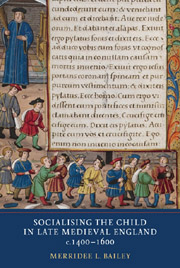Book contents
- Frontmatter
- Contents
- Acknowledgements
- Abbreviations
- Transcription conventions
- Introduction
- 1 Courtesy Poems
- 2 Readers
- 3 Virtue and Vice
- 4 Sixteenth-Century Books
- 5 The School
- Conclusion
- Appendix A Appendix A: English Vernacular Courtesy Poems
- Appendix B Incunabula
- Appendix C Sixteenth-Century Books
- Appendix D Educational Sources
- Bibliography
- Index
- YORK MEDIEVAL PRESS: PUBLICATIONS
2 - Readers
Published online by Cambridge University Press: 05 April 2013
- Frontmatter
- Contents
- Acknowledgements
- Abbreviations
- Transcription conventions
- Introduction
- 1 Courtesy Poems
- 2 Readers
- 3 Virtue and Vice
- 4 Sixteenth-Century Books
- 5 The School
- Conclusion
- Appendix A Appendix A: English Vernacular Courtesy Poems
- Appendix B Incunabula
- Appendix C Sixteenth-Century Books
- Appendix D Educational Sources
- Bibliography
- Index
- YORK MEDIEVAL PRESS: PUBLICATIONS
Summary
‘Thys boke is made fo child[ren] yong’
This chapter provides a comparative examination of the earlier and later courtesy material. In particular, there were continuities and discontinuities between the courtesy poems discussed previously and sixteenth-century material. The changes are viewed in the context of shifting household politics and aristocratic power. By 1500 there were only sixty peers remaining in England, a decline from 200 in c. 1250. At the same time, those who were associated, or were attempting to associate themselves, with the gentry were rapidly increasing in number. In the sixteenth century, the pull towards the Tudor royal court instead of individual elite houses changed the role of the elite household and its social and status-driven meaning. As magnates and lords spent more time at the royal court and at Westminster, the need for on-call household staff lessened. This did not stop the nobility from maintaining large and elaborate seats, nor does it suggest that elite socialisation based on courtesy and manners was no longer of interest to people. It continued to be present in these poems. However, elite socialisation was stable only as long as it related to the elite household and where the concerns of public conduct, hospitality and noble hierarchies remained priorities.
- Type
- Chapter
- Information
- Publisher: Boydell & BrewerPrint publication year: 2012



